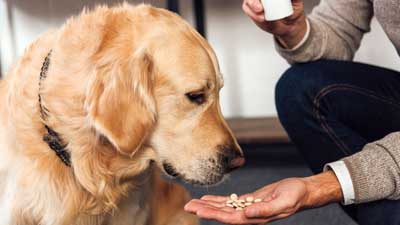- Size
- Smallest
- Small
- Small to Medium
- Medium
- Large
- Giant
- Characteristics
- Smartest
- Hypoallergenic
- Fluffy
- Best Guard
- Best Family
- Best for Kids
- Low Shedding
- Healthiest
- Police Dogs
- Most Calm
- Quietest
- Color
- White
- Black
- Grey
- Brown
- Blue
- Red
- Coat
- Hairless
- Short
- Long
- Origin
- Japan
- China
- Australia
- Germany
- Italy
- United States
- France
- Group
- Hound
- Terrier
- Herding
- Toy
- Working
- Sporting
What Causes Dogs to get Fungal Infections?

Dogs are susceptible to fungal infections for a variety of reasons: from their environment to the types of food they eat, and the way they’re groomed. Some dogs are more prone to getting fungal infections than others, and there are a number of signs and symptoms that pet owners can watch out for. If you think your dog may have a fungal infection, it’s important to take them to the vet for diagnosis and treatment.
Types of Fungal Infections
There are many different types of fungi that can infect dogs, but the most common is dermatophyte, which is the same type of fungus that causes athlete’s foot in humans. Dermatophyte infections usually start on the skin and can spread to the hair, nails, and other areas of the body. Dogs who have dermatophyte infections may have red, scaly, or crusted skin, bald patches, excessive itching, and a musty odor.
Other common types of fungal infections include candida, aspergillosis, and zygomycosis. Candida infections are usually found in the mouth, skin, or nails and can cause white patches, itchiness, and redness. Aspergillosis is a type of lung infection that can be fatal in dogs, and zygomycosis is a rare but potentially deadly infection that affects the digestive system.
Causes of Fungal Infections
There are a number of different things that can cause fungal infections in dogs. Environmental factors like warm, humid weather and standing water can make it more likely for dogs to develop an infection. Dogs who live in kennels or shelters, or who are often in contact with other animals, are also at an increased risk. Dogs with compromised immune systems are more susceptible to fungal infections, as are puppies and senior dogs.
Diet can also play a role in fungal infections. Dogs who eat a lot of processed foods or carbohydrates are more likely to develop candida infections, while those who eat raw meat or fish may be more prone to aspergillosis.
Finally, the way a dog is groomed can also contribute to fungal infections. Dogs who are often bathed in dirty water, or who aren’t dried properly after swimming, are more likely to develop skin infections. And dogs who are frequently shaved or clipped may be more susceptible to nail and hair infections.
Fungal Infection Treatments
Luckily there are treatments for fungal infections, depending on the type of infection and how severe it is. Antifungal shampoos, creams, and oral medications can be used to treat skin infections, while antifungal drugs may be necessary to treat more serious infections like aspergillosis. In some cases, surgery may be necessary to remove infected nails or hair.
The best way to prevent fungal infections is to practice good hygiene and to keep your dog’s environment clean. Avoiding standing water, bathing your dog regularly, and drying them off after they swim can help reduce the risk of skin infections. And feeding your dog a healthy, balanced diet can help boost their immune system and reduce the likelihood of candida infections.
Final Thoughts
Whatever the reason for your dog's fungal infections, it is treatable and preventable if you know what to look for. Be on the lookout for common signs and symptoms, and take your dog to the vet at the first sign of an infection. With prompt treatment, your dog will be back to their fun-loving self in no time!
References
- [2] ^ VSCOT: Diagnosing & Treating Fungal Infections in Dogs
You May Also Like
 Dog HealthHow Long Do Dogs Live With Encephalitis?
Dog HealthHow Long Do Dogs Live With Encephalitis? Dog BehaviorHow Can Dogs Tell If Someone Is Good Or Bad
Dog BehaviorHow Can Dogs Tell If Someone Is Good Or Bad Dog HealthCan humans Get Parvo from Dogs?
Dog HealthCan humans Get Parvo from Dogs? Dog HealthHow Long Does It Take A Dog To Show Signs Of Parvo?
Dog HealthHow Long Does It Take A Dog To Show Signs Of Parvo? Dog HealthCan I Give Human Amoxicillin To My Dog?
Dog HealthCan I Give Human Amoxicillin To My Dog? Dog HealthWhat Happens If A Dog Eats Amoxicillin?
Dog HealthWhat Happens If A Dog Eats Amoxicillin?